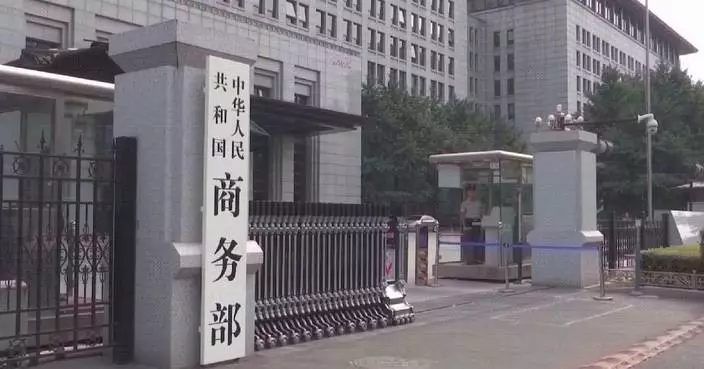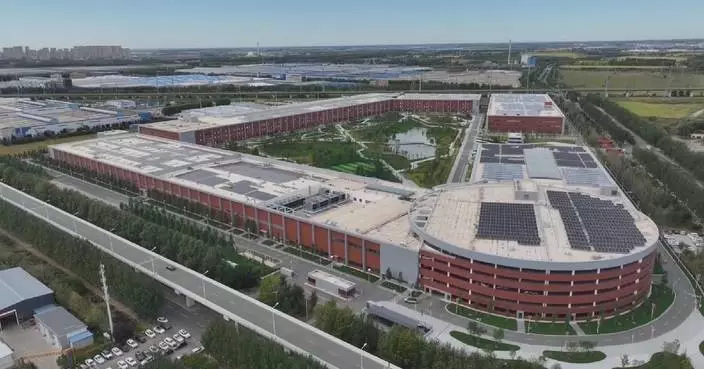Rolf Owonda, an expat from the Republic of the Congo in Xi'an City, capital of northwest China's Shaanxi Province, seeks to build a bridge between China and his homeland through rap and communication, fostering cultural exchanges between the two countries.
In 2011, Rolf, known in Chinese as "Ying Yong", came to Xi'an to study bridge and tunnel engineering at Chang'an University. Since then, he has explored the city's streets and enjoyed its local cuisines, driven by his fascination with Chinese history and culture.
"In my country, we can watch the French channel of China Central Television (CCTV), where I get to know Chinese people, China's countryside, China's delicious food, and beautiful old buildings. This encouraged me to come to China," said Rolf.
To learn Chinese, Rolf created rap music combining lively melodies with the Shaanxi dialect.
"Sometimes, I don't know how to read or understand certain characters, but I look them up in my dictionary. That's what loving a country means to me - embracing its culture, learning its language, and following its rules, rather than just making random videos saying, 'I love you.' I'm spreading Chinese culture, which is my true love," said Rolf.
His rap music reflects his life and feelings. After over a decade in China, Rolf has developed a deep understanding of Chinese culture and loves the country in his unique way. Xi'an has become his second hometown.
In August 2021, He received the first entrepreneur visa in Shaanxi's free trade zone and started his own media company. His business now spans from Xi'an to across China.
Rolf said that his father hoped he would apply his bridge engineering knowledge back in Africa, but Rolf feels his current work is more meaningful.
"I have experience in learning, which helps me enable my compatriots to learn Chinese and understand China, and vice versa. I am also working on thee bridge engineering, which is a culture bridge," said Rolf.
Rolf plans to return to his home country in a few years, using short videos, a communication mode he mastered in China, to share African stories.

Congolese bridges cultures between China, Republic of Congo
Many Singaporeans support raising the re-employment age, partly to stay busy and active in retirement, and to help address demographic challenges in the workforce.
Like many other Asian countries, Singapore is grappling with a rapidly aging population. The government predicts that by 2030, one in four Singaporeans will be aged 65 or older, up from one in 10 two decades ago.
A survey on retirement and employment conducted last year in the country found broad support for raising the national retirement age, with about 88 percent of those aged 50 and above in favor.
Some supported increasing the retirement age because continuing to do what they love, rather than retiring, keeps them feeling youthful and fulfilled.
When Nancy Hor, a retired IT operations manager, left her job five years ago, she wasn't sure how to fill her time.
"I'm a workaholic. At the very first stage after I retired, I felt I could not find balance," she said.
Hor, now 70, said it took her some time to adjust. In her spare time, she stays busy line dancing and spending time with her family.
But she said that if she had had the choice, she would have liked to stay employed a little longer.
"I think it's good for the elderly that even they have some job to do, and keep them busy," said Hor.
In March, authorities announced plans to raise the retirement age to 64 and the re-employment age to 69 by 2026.
Singapore's Minister of State for Manpower, Gan Siow Huang, said the changes to the rules protect senior workers from dismissal due to age-related issues before they reach the statutory retirement age. Employers are also required to offer re-employment to eligible workers until they reach the statutory re-employment age limit.
This follows a similar move made two years ago to raise the retirement and re-employment ages to 63 and 68, respectively. The city-state is also aiming for a retirement age of 65 and a re-employment age of 70 by 2030.
"That is to reduce the impact on businesses, so it gives time for businesses to adapt their policy. This gradual increase in retirement age basically provides a framework for individuals like myself, who want to continue to be gainfully employed," said Patrick Chang, a retirement planning specialist and the author of the A to Z guide to retirement planning.
Chang said that businesses will need to make adjustments to accommodate the changes, including offering retraining for senior workers.
He noted that the changes won't impact those who still wish to retire earlier, but given Singapore's demographic challenges, the country cannot afford to remain idle.
"If we don't do it now, the social cost could be high. We cannot wait until the time when we need it today, and then we get something done. It will probably be a bit too late, and the cost of getting to that solution will be higher," said Chang.

Many Singaporeans support raising retirement, re-employment ages










